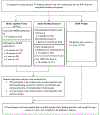Infant appetite traits, feeding practices and child obesity in low-income Hispanic families
- PMID: 35274484
- PMCID: PMC9283219
- DOI: 10.1111/ijpo.12913
Infant appetite traits, feeding practices and child obesity in low-income Hispanic families
Abstract
Background: Appetite traits and feeding practices are important determinants of child weight and obesity.
Objectives: This study examined whether: (1) infant appetite traits were associated with feeding practices and (2) feeding practices mediated the link between appetite traits and weight-for-age z-scores at age 3 years.
Methods: We conducted a secondary data analysis from the 'Starting Early Program' of low-income, Hispanic mother-child pairs. Appetite traits were assessed using the Baby Eating Behaviour Questionnaire. Infant feeding practices were collected using 24-h dietary recalls and surveys: (1) breastfeeding exclusivity, intensity and duration; (2) early introduction to complementary foods/liquids and (3) any 100% fruit juice consumption at age 10 months. Regression and mediation analyses were used to explore associations between appetite, feeding and weight.
Results: Higher infant Slowness in Eating scores were associated with greater breastfeeding exclusivity, intensity and duration, compared to lower Slowness in Eating. Infants with higher Slowness in Eating and Satiety Responsiveness had lower odds of early introduction to complementary foods/liquids. Infants with higher Enjoyment of Food had greater odds of 100% juice consumption. Breastfeeding duration mediated the relationship between higher infant Slowness in Eating and lower weight-for-age z-scores.
Conclusions: Appetite traits represent potential targets for early life infant feeding interventions.
Keywords: Hispanic; appetite traits; breastfeeding; infant feeding practices; obesity.
© 2022 World Obesity Federation.
Conflict of interest statement
Figures


References
Publication types
MeSH terms
Grants and funding
LinkOut - more resources
Full Text Sources
Medical

